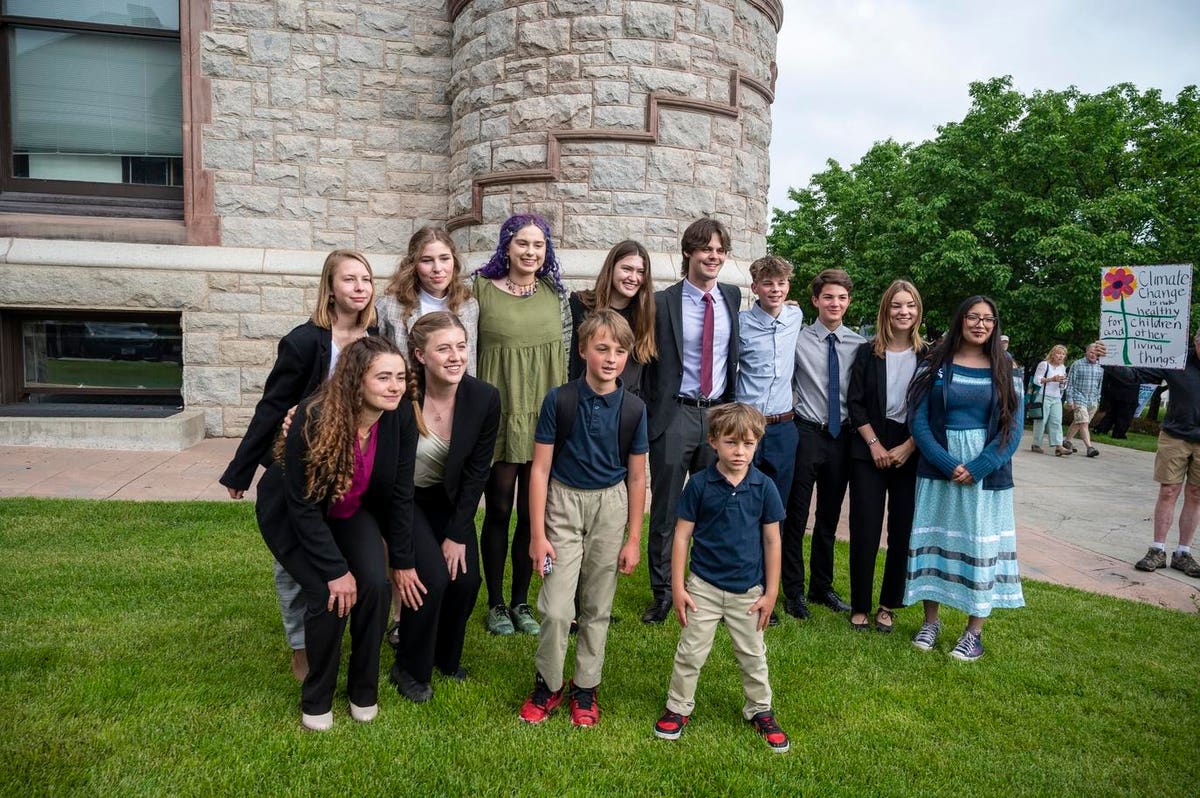“Plaintiffs have a fundamental constitutional right to a clean and healthful environment, which includes climate as part of the environmental life-support system.” Those were the magic words in the final decision in Rikki Held et al v. the State of Montana signed by Montana District Court Judge Kathy Seeley in Helena, Montana. The 16 young plaintiffs range in age today from 5 to 22 years old, with Rikki Held the oldest.
The judge ruled that the Montana government knew about the dangers of climate change when Governor Greg Gianforte signed the MEPA limitation on May 10, 2023, which states that, “”an environmental review conducted pursuant to subsection (1) may not include an evaluation of greenhouse gas emissions and corresponding impacts to the climate in the state or beyond the state’s borders.” Because they knew about the dangers of greenhouse gas emissions, and a “healthful environment” is a fundamental constitutional right, the MEPA limitation is unconstitutional.
The Governor signed it despite knowing, the ruling said, that, “It has long been understood that certain GHGs, including CO2and methane (CH4), trap heat in the atmosphere, causing the Earth to warm” (#73). Adding that they knew this, the ruling said, “State government and scientists have known about the international scientific consensus of the dangers posed by climate change since at least the 1990s when the IPCC started issuing climate assessment reports. The State also had access to the congressionally mandated national climate assessments undertaken in 2000, 2009, 2014, and 2017.”
This ruling affirming the right to live in a “healthful environment,” and that it includes addressing known threats such as climate change, is a “fundamental constitutional right,” empowers other plaintiffs to make the same claim in other states in an effort to hold their elected officials and potentially private companies accountable.
Montana is the 5th largest coal producer in the U.S.
The Defendants are the State of Montana, Governor Greg Gianforte (Republican); Montana Department of Environmental Quality; Montana Department of Natural Resources and Conservation; Montana Department of Transportation; and Montana Public Service Commission.
The Energy Information Agency (EIA) lists Montana as the fifth-largest coal producer, producing 5% of the nation’s coal supply, behind Wyoming (41%), West Virginia (14%), Pennsylvania (7%), and Illinois (6%). The EIA also states that, “in 2021, CO2 emissions from burning coal for energy accounted for about 20% of total U.S. energy-related CO2 emissions and for nearly 60% of total CO2 emissions from the electric power sector.”
They can’t vote but they can sue – and win – and exert pressure through protests and speeches
“Today, for the first time in U.S. history, a court ruled on the merits of a case that the government violated the constitutional rights of children through laws and actions that promote fossil fuels, ignore climate change, and disproportionately imperil young people,” said Julia Olson, Chief Legal Counsel and Executive Director with Our Children’s Trust in a press release issued by the Trust. “In a sweeping win for our clients, the Honorable Judge Kathy Seeley declared Montana’s fossil fuel-promoting laws unconstitutional and enjoined their implementation.”
The Montana Plaintiffs followed in the footsteps of the young plaintiffs in Juliana v. U.S., featured in the award-winning film “Youth v. Gov.” That is where U.S. District Court Judge Ann Aiken in Eugene, Oregon said, “Exercising my ‘reasoned judgment,’ I have no doubt that the right to a climate system capable of sustaining human life is fundamental to a free and ordered society.”
There are 1.8 billion people between the ages of 10 and 24 on the planet, according to the United Nations, which it says is “the largest generation of youth in history.” The UN Youth In Action webpage adds that, “Young people are increasingly aware of the challenges and risks presented by the climate crisis and of the opportunity to achieve sustainable development brought by a solution to climate change.”
This landmark Montana case is likely to mobilize more such legal actions and more climate protests among this generation. Our Children’s Trust has legal actions pending in four other states – Florida, Hawaii, Utah and Virginia – and is involved in such actions in all 50 states, according to their website.
The world has come to know Greta Thunberg, the Swedish activist now 20 years old, who started galvanizing her generation at 15 years old with her School Strikes For Climate. There’s also Alexandra Villasenor in the U.S., and Ayisha Siddiqa and Fatou Jeng at the U.N.
Stay tuned.
Read the full article here





